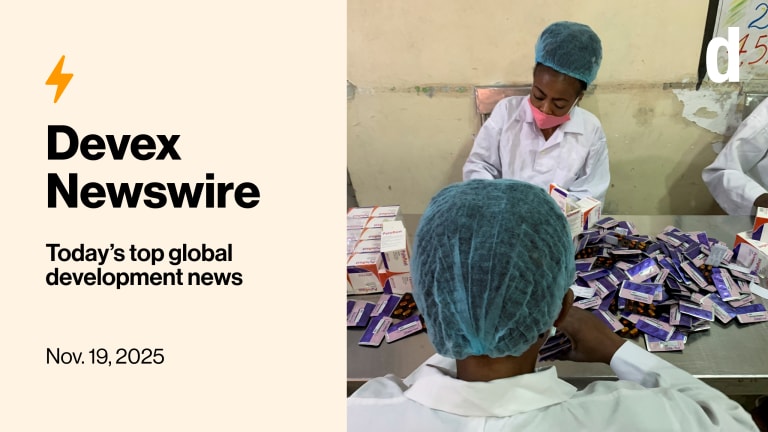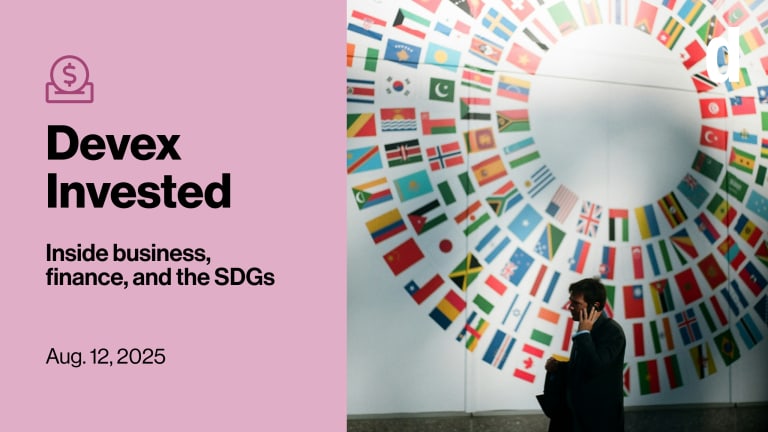
France is readying for the first round of its presidential elections on Sunday, a vote that could have a dramatic impact on development policy in France and the European Union, as well as the broader multilateral order.
Though the campaign has largely focused on domestic politics and security, the candidates to become France’s next leader differ, at times dramatically, in their views on how aid should be spent. Foreign aid generally enjoys strong popular support in France and is likely to continue at current or greater spending levels, leaving questions marks over how and where the funds would be allocated.
Eleven candidates are vying for the post in the first round of elections, and if no one gets more than 50 percent, as is expected, there will be a second round election between the top two candidates. The highest polling contenders now are the National Front’s Marine Le Pen, centrist Emmanuel Macron, Jean-Luc Mélenchon from the left party, François Fillion from the Republican party and the Socialist Party’s Benoît Hamon.
Four of the top five candidates have said that they want France to meet the target of spending 0.7 percent of national income on official development assistance. Yet with some candidates advocating to leave the EU, or adopt a more inward-facing policy, the election could also have ripple effects for the multilateral system on a variety of issues, including development.
The 0.7 percent target
Advocates are watching to see if, and how soon, French development aid spending might increase under the next president. All the top candidates except Fillon have committed to the 0.7 percent spending target. Their timelines for doing so differ widely or aren’t clear.
Current French President Francois Hollande had also committed to meeting the 0.7 percent target, but aid has instead fallen during much of his time in office. In 2010 nearly 0.5 percent of France’s national income was contributed to aid, but it dipped to about 0.37 percent in 2014 and 2015 before ticking up slightly to 0.38 percent, according to the Organisation for Economic Co-operation and Development.
Some detail on candidates’ views emerges from information gathered by the ONE Campaign France, which asked candidates to submit questionnaires about their stances on aid and commit to reaching the 0.7 percent target by the end of their term in 2022. Mélenchon and Hamon have replied — fewer top candidates than when ONE has conducted similar surveys in past votes, said Friederike Röder, ONE France director.
Mélenchon suggested paying for an increase in aid spending through existing taxes on financial transactions and airline tickets, according to information he gave to the ONE Campaign France.
Le Pen, who has committed to the 0.7 target, has said aid is a matter of national security. Macron has called for progressive increases in aid based on the health of the economy, eventually meeting the 0.7 target by 2030.
Will aid be conditional?
One of the greatest issues at stake in this election is how closely French aid will be tied to concerns about migration, and whether aid will be contingent on policies requiring countries either take back migrants or deter them from leaving. Both Le Pen and Fillon have said they would support a policy that would link aid to the return of migrants.
The idea of tying aid to a return of migrants has been floated in the past, though the idea was dismissed. France does have a development and migration policy. And more broadly, a 2013 OECD report found that about 10 percent of French ODA was tied in 2007.
During a visit to Chad last month, Le Pen said she supports development efforts on the continent so that Africans will have jobs and opportunities at home, rather than migrating to Europe.
“If all these young people do not find their place in their societies, as is the case today for many of them, they will create chaotic situations at home and far beyond,” she said, according to a translation of a transcript of the speech on her website. “With them, they will take what is due to them through violence, anarchy, warlords, criminal gangs or jihadist groups: The fragile states of the continent will not be able to resist for a long time. They will give way to areas of no law from which all dangers can come from Europe.”
At a recent event about development and the French election organized by the Institute for Sustainable Development and International Relations, or IDDRI, and Sciences Po, Le Pen representative Bertrand Dutheil de la Rochère said that aid may also be tied to countries buying French products, in part to bolster domestic support, so people see a tangible local impact from development spending.
Hamon and Mélenchon have both rejected aid conditionality.
“France will never use development aid for any other purpose than the fight against extreme poverty,” Hamon said in a statement to the ONE campaign. Macron has recently removed language from his platform that would tie aid to migration, ONE’s Röder said.
The idea that aid should be tied to migration deals or other prerequisites raises concerns for some in the development community, Röder said. “Obviously [migration] should not be linked to aid. What it is doing is blackmailing countries. For us it is really a red line.”
What AFD reform means for the future of French aid
Devex caught up with Philippe Orliange, director of strategy, partnership and communication at the French Development Agency to learn more about an upcoming reform to French aid.
Philippe Orliange, director of strategy, partnership and communication at the Agence Française de Développement, called the proposal to tie aid to migration nonsensical and told Devex that the two issues should not be linked. Experience and evidence shows that the poorest people are not the ones who migrate, he said.
Aid priorities
The candidates have different visions for where and how aid should be spent. While some have offered hints of their priorities, many specifics remain unknown.
Macron may provide the most continuity, according to Jean-Michel Severino, CEO of Investisseurs & Partenaires, who was director-general of the French development agency from 2001 to 2010.
Severino, who represented Macron at the IDDRI event, told audiences that France’s current focus on Africa should continue in light of growing challenges in employment, business opportunities and education. He suggested building development tools around those challenges, as well as climate issues and major endemic diseases.
Le Pen has also said she intends to focus on security forces, agriculture, infrastructure, education and health, according to an Institute for Security Studies post.
Mélenchon has proposed helping countries combat their debt burden, improve transparency and reduce tax evasion, the latter coming through an international or EU effort, according to his statement to the ONE Campaign France. He has suggested French aid should focus on gender, Africa and least developed countries, and pledged to allocate 50 percent of French development aid to LDCs by 2022.
Hamon proposed that increases in aid be used to fund primary and secondary education and gender equality. He told the ONE Campaign France that he would also prioritize improving governance and supporting citizen movements, including supporting civil society, parliaments, courts and other institutions. Other goals would include fighting corruption and tax evasion, as well as promoting corporate transparency.
Hamon’s representative at the IDDRI event, Yannick Jadot, stressed that development should not exploit resources or cause climate disruption. “Helping countries to develop begins with stopping harming them,” Jadot said.
Geographically, candidates seem to generally agree that Africa will remain a priority. Hamon wrote to ONE that his priority would be the Sahel, but that he intends to increase aid to the poorest and most fragile countries in Africa in general. French aid should focus on the Sahel struggling with “jihadist tumors,” Le Pen said in Chad. She also said that France must develop an exit strategy for its troops in Mali, which are taking part in Operation Barkhane, the anti-insurgent operation in the region.
How will aid be delivered?
The next French president could reshape how aid is distributed. France is one of the largest contributors to EU aid — in 2015 it was the third largest behind the U.K. and Germany. About one-third of French aid is distributed through multilateral organizations and the EU, according to AFD data. Much of French aid is distributed through loans and other financial products rather than grants. In 2015, only about $220 million of the total aid budget of more than $9 billion was in bilateral grants, according to Orliange.
Aid after historic Brexit vote
In the wake of the United Kingdom's vote to leave the European Union, aid stakeholders take stock of budgets, regional strategies and the possibly seismic impact on U.K. and EU aid priorities.
On opposite sides of the political spectrum, Le Pen and Mélenchon have advocated withdrawing from the EU, which could have significant implications for aid. Representatives of the two candidates at the IDDRI event both argued that France should pull back or not increase its contributions to the EU, spending more foreign aid funds directly in francophone countries.
Mélenchon has also pledged to withdraw from the International Monetary Fund and the World Bank and instead work toward “creating a Social Emergency Fund and a Social Investment Bank,” according to a report from France24. He does support the U.N., according to his statement to ONE.
The leftwing candidate also supports using more grants and technical assistance, as opposed to the current focus on loans. He would seek to strengthen partnerships between the government and NGOs, because they have knowledge that diplomats lack, said Bernard Féraud, who represented Mélenchon at the IDDRI event.
Le Pen, meanwhile, has advocated giving more aid to governments rather than civil society organizations. France spends less than 1 percent of ODA on disbursements to NGOs, according to the OECD’s development assistance committee’s most recent peer review. Le Pen has said she prefers bilateral aid rather than multilateral organizations such as the U.N. and the EU, according to the Institute for Security Studies.
By contrast, Macron supports multilateralism and would be unlikely to change the status quo, his representative Severino said. Though some rethinking may be needed at the EU, after Britain’s exit. “We need collaboration, and cooperation at a global and regional scale to fix the problems we are facing,” he said.
Jean Bizet, who was representing Fillon at the IDDRI event, said that development needs to be global and European. “We won’t fix anything until we go beyond the military problem only, and start investing in territories that are evolving, are in mutation, and until Europe gives more money to these countries, in order to offer youth and women a professional future,” he said.
Hamon would support providing more money bilaterally in the grants, particularly to the poorest and most fragile countries. Many in the development community would welcome such a shift toward grant funding.
The polls and pundits are predicting a runoff between Le Pen and Macron: Candidates whose ideologies move in opposite directions, toward nationalism and multilateralism, respectively. If recent elections across the globe have demonstrated anything, however, it’s that observers may do well to expect the unexpected.
Freelancer Ignacio Petitcollot contributed reporting.
Read more international development news online, and subscribe to The Development Newswire to receive the latest from the world’s leading donors and decision-makers — emailed to you free every business day.






